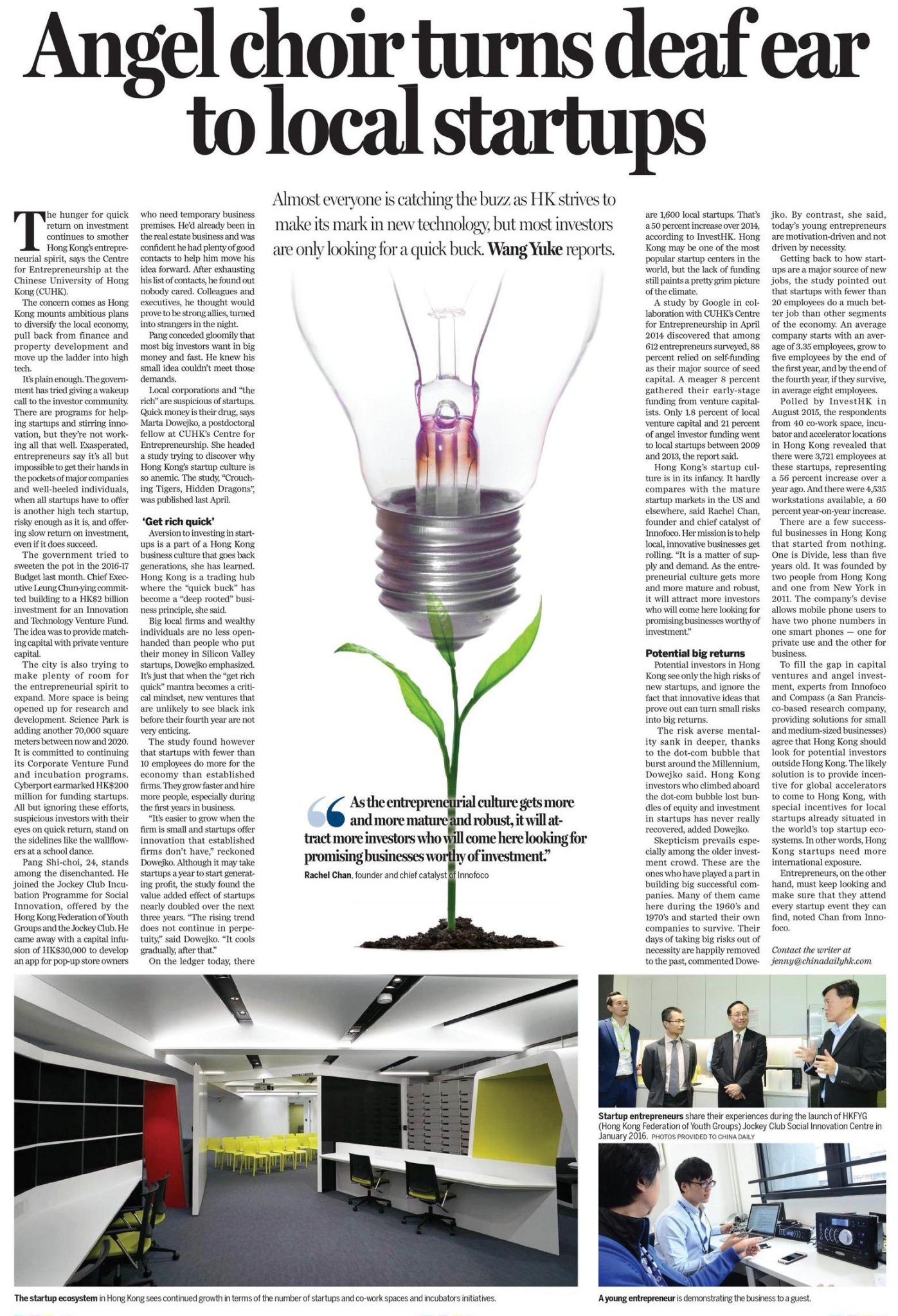Angel Choir Turns Deaf Ear to Local Startups

Almost everyone is catching the buzz as Hong Kong strives to make its mark in new technology. Post-doctoral fellow Marta Dowejko says in an interview with China Daily that local corporations and “the rich” are suspicious of startups and quick money is their drug.
Almost everyone is catching the buzz as Hong Kong strives to make its mark in new technology. Unfortunately, most investors are only looking for a quick buck. And this hunger for quick returns on investment continues to smother Hong Kong’s entrepreneurial spirit, according to Centre for Entrepreneurship (CfE) at The Chinese University of Hong Kong (CUHK) Business School.
The concern comes as Hong Kong mounts ambitious plans to diversify the local economy, pull back from finance and property development and move up the ladder into high tech.
Local corporations and “the rich” are generally suspicious of startups. Quick money is their drug, says Marta Dowejko, a post-doctoral fellow at CUHK CfE. She headed a study that attempted to discover why Hong Kong’s startup culture is so anemic. The study, “Crouching Tigers, Hidden Dragons,” coauthored by her and Kevin Au, Associate Professor of Department of Management and Director of Centre for Entrepreneurship and Centre for Family Business at CUHK Business School, was released on 15 April, 2015.
An aversion to investing in startups is part of the Hong Kong business culture, which goes back generations, Dowejko has learned. Hong Kong is a trading hub where the “quick buck” has become a “deep-rooted” business principle, she says.
Big local firms and wealthy individuals are no less open-handed than people who put their money in Silicon Valley startups, Dowejko emphasizes. It is just that when the “get-rich-quick” mantra becomes a critical mindset, new ventures that are unlikely to be in the black before their fourth year are not very enticing to investors.
The study found, however, that startups with fewer than 10 employees do more for the economy than established firms. They grow faster and hire more people, especially during the first years in business. Pinpointing how startups are a major source of new jobs, the study revealed that those with fewer than 20 employees actually do a much better job on this front than other segments of the economy. An average company starts with an average of 3.35 employees, grows to five employees by the end of the first year, and if it survives by the end of the fourth year, it will have an average of 8 employees.
“It’s easier to grow when the firm is small and startups offer innovations that established firms don’t have,” reckoned Dowejko. Although it may take startups a year to start generating profits, the study found the value-added effect of startups nearly doubled over the subsequent three years. “The rising trend does not continue in perpetuity,” said Dowejko. “It cools gradually after that.”
According to findings released on 2 September, 2014 in the Empowering Young Entrepreneurs (EYE) Program Entrepreneurship Ecosystem of Hong Kong Interim Report, a study by Google in collaboration with CUHK CfE, 88 percent of the 612 entrepreneurs surveyed relied on self-funding as their major source of seed capital. A meager 8 percent gathered their early-stage funding from venture capitalists. Only 1.8 percent of local venture capital and 21 percent of angel investor funding went to local startups between 2009 and 2013, the report said.
Potential investors in Hong Kong see only the high risks of new startups and ignore the fact that innovative ideas can turn small risks into big returns.
The risk-averse mentality sank in deeper after the dot-com bubble that burst around the turn of the century, Dowejko said. Hong Kong investors who climbed on board the dot-com bubble lost bundles of equity and investments in startups have never really recovered, she added.
Skepticism prevails, especially among the older investment crowd. They are the ones who have played a part in building big successful companies in Hong Kong. Many of them came here during the 1960s and 1970s and started their own companies to survive. Their days of taking big risks out of necessity are neatly tucked into the past, commented Dowejko. By contrast, she said, today’s young entrepreneurs are driven by their own motivation rather than by necessity… Read More (PDF)
Or click the images below to read the full article.
Source: China Daily
Date published: 24 March, 2016
Photo: China Daily


